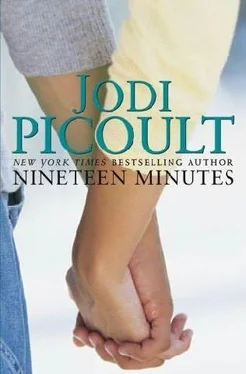She did not know quite what to feel when confronted with Josie Cormier. They’d spent the day playing hangman-the irony of which, given her son’s fate, wasn’t lost on her. Lacy had known Josie as a newborn, but also as a little girl and as a playmate for Peter. Because of this, there had been a point where she had viscerally hated Josie in a way that even Peter never seemed to, for being cruel enough to leave her son behind. Josie may not have initiated the teasing that Peter suffered over his middle and high school years, but she didn’t intervene either, and in Lacy’s book, that had made her equally responsible.
As it turned out, though, Josie Cormier had grown into a stunning young woman, one who was quiet and thoughtful and not at all like the vacuous, material girls who trolled the Mall of New Hampshire or encompassed the social elite of Sterling High-girls Lacy had always likened to black widow spiders, looking for someone they could destroy. Lacy had been surprised when Josie had peppered her with polite questions about Peter: Was he nervous about the trial? Was it hard, being in jail? Did he get picked on there? You should send him a letter, Lacy had suggested to her. I’m sure he’d like to hear from you.
But Josie had let her glance slide away, and that was when Lacy realized that Josie had not really been interested in Peter; she had only been trying to be kind to Lacy.
When court recessed for the day, the witnesses were told they could go home, provided they did not watch the news or read the papers or speak about the case. Lacy excused herself to go to the bathroom while she waited for Lewis, who’d be fighting the crush of reporters that would surely be packing the lobby outside the courtroom. She had just come out of the stall and was washing her hands when Alex Cormier stepped inside.
The racket in the hallway rode in on her heels, then cut off abruptly as the door shut. Their eyes met in the long mirror over the bank of sinks. “Lacy,” Alex murmured.
Lacy straightened and reached for a paper towel to dry her hands. She didn’t know what to say to Alex Cormier. She could barely even imagine that at one point, she’d had anything to say to her.
There was a spider plant in Lacy’s midwifery office that had been dying by degrees, until the secretary moved a stack of books that had been blocking a window. She had forgotten to move the plant, though, and half the shoots started straining toward the light, growing in an unlikely sideways direction that seemed to defy gravity. Lacy and Alex were like that plant: Alex had moved off on a different course, and Lacy-well, she hadn’t. She’d withered up, wilted, gotten tangled in her own best intentions.
“I’m sorry,” Alex said. “I’m sorry you have to go through this.”
“I’m sorry, too,” Lacy replied.
Alex looked like she was going to speak again, but she didn’t, and Lacy had run out of conversation. She started out of the bathroom to find Lewis, but Alex called her back. “Lacy,” she said. “I remember.”
Lacy turned around to face her.
“He used to like the peanut butter on the top half of the bread and the marshmallow fluff on the bottom.” Alex smiled a little. “And he had the longest eyelashes I’d ever seen on a little boy. He could find anything I’d dropped-an earring, a contact lens, a straight pin-before it got lost permanently.”
She took a step toward Lacy. “Something still exists as long as there’s someone around to remember it, right?”
Lacy stared at Alex through her tears. “Thank you,” she whispered, and left before she broke down completely in front of a woman-a stranger, really-who could do what Lacy couldn’t: hold on to the past as if it was something to be treasured, instead of combing it for clues of failure.
“Josie,” her mother said as they were driving home. “They read an email today in court. One that Peter had written to you.”
Josie faced her, stricken. She should have realized this would come out at the trial; how had she been so stupid? “I didn’t know Courtney had sent it out. I didn’t even see it until after everyone else had.”
“It must have been embarrassing,” Alex said.
“Well, yeah. The whole school knew he had a crush on me.”
Her mother glanced at her. “I meant for Peter.”
Josie thought about Lacy Houghton. Ten years had passed, but Josie had still been surprised by how thin Peter’s mom had gotten; how her hair was nearly all gray. She wondered if grief could make time run faster, like a glitch in a clock. It was incredibly depressing, since Josie remembered Peter’s mother as someone who never wore a wristwatch, someone who didn’t care about the mess if the end result was worthy. When Josie was little and they played over at Peter’s, Lacy would make cookies from whatever was left in her cabinet-oatmeal and wheat germ and gummy bears and marshmallows; carob and cornstarch and puffed rice. She once dumped a load of sand in the basement during the winter so that they could make castles. She let them draw on the bread of their sandwiches with food coloring and milk, so that even lunch was a masterpiece. Josie had liked being at Peter’s house; it was what she’d always imagined a family felt like.
Now she looked out the window. “You think this is all my fault, don’t you?”
“No-”
“Is that what the lawyers said today? That the shooting happened because I didn’t like Peter…the way he liked me?”
“No. The lawyers didn’t say that at all. Mostly the defense talked about how Peter got teased. How he didn’t have many friends.” Her mother stopped at a red light and turned, her wrist resting lightly on the steering wheel. “Why did you stop hanging around with Peter, anyway?”
Being unpopular was a communicable disease. Josie could remember Peter in elementary school, fashioning the tinfoil from his lunch sandwich into a beanie with antennae, and wearing it around the playground to try to pick up radio transmissions from aliens. He hadn’t realized that people were making fun of him. He never had.
She had a sudden flash of him standing in the cafeteria, a statue with his hands trying to cover his groin, his pants pooled around his ankles. She remembered Matt’s comment afterward: Objects in mirror are way smaller than they appear.
Maybe Peter had finally understood what people thought of him.
“I didn’t want to be treated like him,” Josie said, answering her mother, when what she really meant was, I wasn’t brave enough.
Going back to jail was like devolution. You had to relinquish the trappings of humanity-your shoes, your suit and tie-and bend over to be strip-searched, probed with a rubber glove by one of the guards. You were given another prison jumpsuit, and flip-flops that were too wide for your feet, so that you looked just like everyone else again and couldn’t pretend to yourself that you were better than them.
Peter lay down on the bunk with his arm flung over his eyes. The inmate beside him, a guy awaiting trial for the rape of a sixty-six-year-old woman, asked him how it had gone in court, but he didn’t answer. That was the only freedom he had left, pretty much, and he wanted to keep the truth to himself: that when he’d been put in his cell, he’d actually felt relieved to be back (could he say it?) home.
Here, no one was staring at him as if he were a growth on a petri dish. No one really looked at him at all.
Here, no one talked about him as if he were an animal.
Here, no one blamed him, because they were all in the same boat.
Jail wasn’t all that different from public school, really. The correctional officers were just like the teachers-their job was to keep everyone in place, to feed them, and to make sure nobody got seriously hurt. Beyond that, you were left to your own devices. And like school, jail was an artificial society, with its own hierarchy and rules. If you did any work, it was pointless-cleaning the toilets every morning or pushing a library cart around minimum security wasn’t really that different from writing an essay on the definition of civitas or memorizing prime numbers-you weren’t going to be using them daily in your real life. And as with high school, the only way to get through jail was to stick it out and do your time.
Читать дальше












